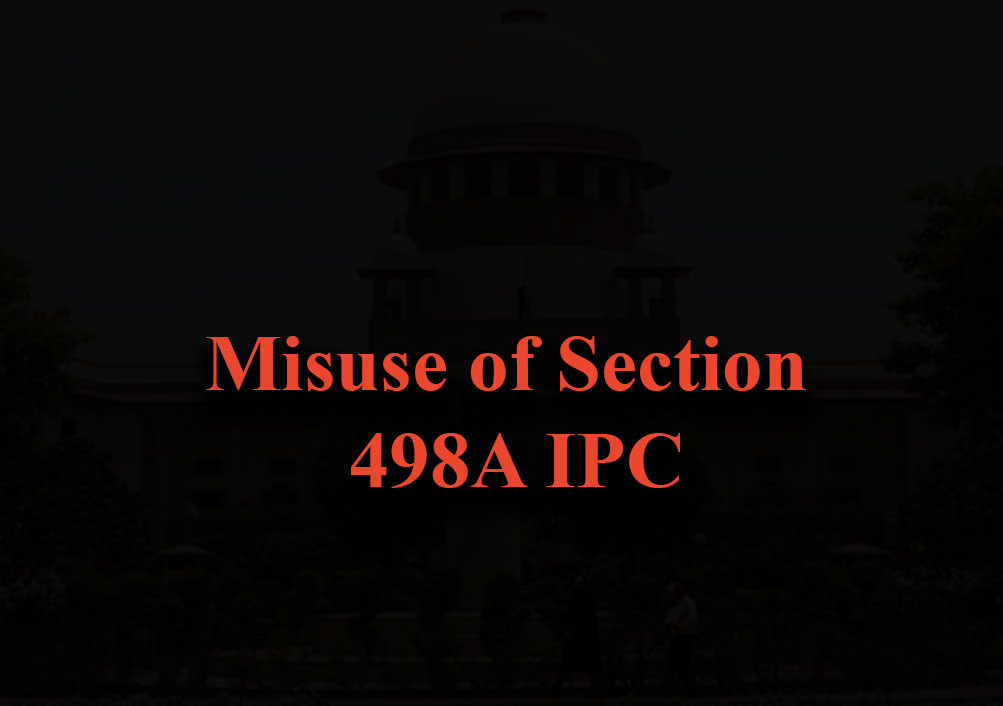Top Court expresses concern over misuse of Section 498A IPC & increased tendency of implicating husband’s relatives in matrimonial dispute; Quashes FIR containing general omnibus allegations against in-laws

Read Judgment: Kahkashan Kausar @ Sonam & Ors. V. State of Bihar & Ors.
Pankaj Bajpai
New Delhi, February 9, 2022: Highlighting that no specific allegations had been made against the husband and his in-laws and none of them had been attributed any specific role in furtherance of the general allegations made against them by the complainant-wife, the Supreme Court has held that allowing prosecution for dowry demand and harassment in the absence of clear allegations against the in-laws would simply result in an abuse of the process of law.
A Division Bench of Justice S. Abdul Nazeer and Justice Krishna Murari observed that in the absence of any specific role attributed to the accused, it would be unjust if they are forced to go through the tribulations of a trial.
General and omnibus allegations cannot manifest in a situation where the relatives of the complainant’s husband are forced to undergo trial, added the Bench.
Going by the background of the case, Tarannum Akhtar (fifth Respondent – Complainant) was married to Md. Ikram on September 18, 2017. Kahkashan Kausar & Others (appellants) are the in-laws of the complainant.
On December 11, 2017, the said Respondent initially instituted a criminal complaint against her husband and the appellants alleging demand for dowry and harassment. The Magistrate concluded that upon perusal of material evidence no prima-facie case was made against the in-laws and that the allegations levelled against them were not specific in nature. The said court, however, took cognizance for the offence u/s 498A, 323 IPC against the husband Md. Ikram, and issued summons. This dispute was eventually resolved and the complainant-wife came back to the matrimonial home.
Subsequently, the wife gave another written complaint for registration of FIR u/s 341, 323, 379, 354, 498A r/w/s 34 IPC against her husband Md. Ikram and the appellants. The complaint inter-alia alleged that all the accused were pressurizing the Respondent-wife to purchase a car as dowry, and she was threatened to forcibly terminate her pregnancy if the demands were not met. On Writ Petition being filed, the Patna High Court dismissed the application for quashing of the FIR. Hence, the present SLP.
After considering the submissions, the Top Court noted that incorporation of section 498A of IPC was aimed at preventing cruelty committed upon a woman by her husband and her in-laws, by facilitating rapid state intervention.
However, in recent times, matrimonial litigation in the country has also increased significantly and there is a greater disaffection and friction surrounding the institution of marriage, now, more than ever, which has resulted in an increased tendency to employ provisions such as 498A IPC as instruments to settle personal scores against the husband and his relatives, added the Court.
Speaking for the Bench, Justice Murari expressed concern over the misuse of section 498A IPC and the increased tendency of implicating relatives of the husband in matrimonial disputes, without analysing the long term ramifications of a trial on the complainant as well as the accused.
False implication by way of general omnibus allegations made in the course of matrimonial dispute, if left unchecked would result in misuse of the process of law and therefore, the courts should be cautious from proceeding against the relatives and in-laws of the husband when no prima facie case is made out against them, reiterated the Bench.
The Top Court observed that it has been highlighted in varied instances that a criminal trial leading to an eventual acquittal also inflicts severe scars upon the accused, and such an exercise must therefore be discouraged.
Hence, the Apex Court set aside the order passed by the Patna High Court and quashed the FIR against the Appellants u/s 341, 323, 379, 354, 498A r/w/s 34 IPC.
Sign up for our weekly newsletter to stay up to date on our product, events featured blog, special offer and all of the exciting things that take place here at Legitquest.




Add a Comment